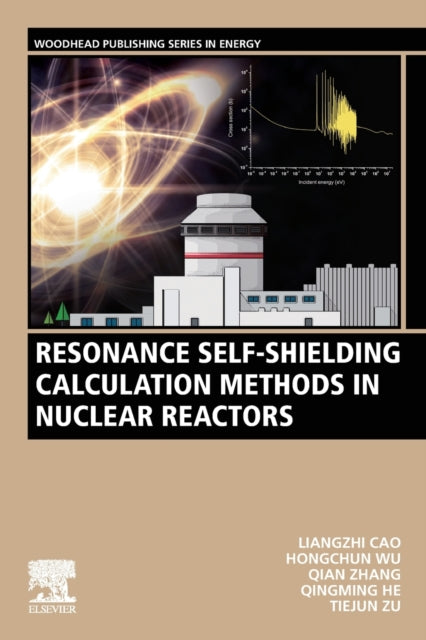LiangzhiCao,HongchunWu,QianZhang,QingmingHe,TiejunZu
Resonance Self-Shielding Calculation Methods in Nuclear Reactors
Resonance Self-Shielding Calculation Methods in Nuclear Reactors
- Condition: Brand new
- UK Delivery times: Usually arrives within 2 - 3 working days
- UK Shipping: Fee starts at £2.39. Subject to product weight & dimension
Bulk ordering. Want 15 or more copies? Get a personalised quote and bigger discounts. Learn more about bulk orders.
Couldn't load pickup availability
- More about Resonance Self-Shielding Calculation Methods in Nuclear Reactors
Resonance Self-Shielding Calculation Methods in Nuclear Reactors is a comprehensive book that covers the latest advancements in resonance self-shielding methods for deterministic and Mote Carlo approaches, highlighting key developments over the past decade. It provides practical guidance for students and professionals in nuclear engineering and technology, offering high-precision and efficient methods for shielding calculations.
Format: Paperback / softback
Length: 410 pages
Publication date: 06 October 2022
Publisher: Elsevier Science Publishing Co Inc
The field of resonance self-shielding calculation methods in nuclear reactors has witnessed significant advancements in recent years, with both deterministic and Monte Carlo approaches making notable progress. These developments include key breakthroughs such as high-fidelity resonance treatment, resonance interference effect, and multi-group equivalence. In response to the growing demand for high-fidelity resonance self-shielding treatment, driven by the rapid advancement of advanced nuclear reactor concepts and the proliferation of high-performance computational technologies, this practical book serves as a valuable guide for students and professionals in nuclear engineering and technology. It provides a comprehensive exploration of various methods, each with proven high precision and efficiency, enabling them to effectively address the shielding challenges associated with nuclear reactors.
The book begins by introducing the fundamental principles of resonance self-shielding and discussing the underlying physical phenomena. It then delves into the development and implementation of deterministic and Monte Carlo methods, highlighting their strengths and limitations. The authors provide detailed explanations of these methods, including their computational frameworks, parameterization techniques, and validation procedures.
One of the key advancements in resonance self-shielding methods is the development of high-fidelity resonance treatment. This approach involves incorporating detailed physical models of the reactor core and surrounding structures into the shielding calculation process, allowing for more accurate predictions of the shielding performance. The book discusses the principles of high-fidelity resonance treatment and showcases its application in various shielding scenarios, including reactor designs, shielding materials, and radiation sources.
Resonance interference effect is another important development in resonance self-shielding. It refers to the interaction between different radiation sources and the shielding materials used in nuclear reactors. The book explores the mechanisms behind resonance interference effect and provides practical guidelines for mitigating its impact on shielding calculations. It also discusses the use of multi-group equivalence methods, which allow for the efficient modeling of complex shielding configurations and the optimization of shielding designs.
Throughout the book, real-world examples and case studies are used to illustrate the practical application of resonance self-shielding methods. These examples cover a wide range of nuclear reactor designs, including pressurized water reactors, fast reactors, and breeder reactors. The authors provide detailed analysis of the shielding calculations performed in these cases, highlighting the key insights and challenges encountered.
In conclusion, Resonance Self-Shielding Calculation Methods in Nuclear Reactors is a comprehensive and up-to-date resource for students and professionals in nuclear engineering and technology. It provides a thorough exploration of the latest progress in resonance self-shielding methods, including high-fidelity resonance treatment, resonance interference effect, and multi-group equivalence. The book offers practical guidance and insights into various shielding calculation approaches, enabling readers to effectively address the shielding challenges associated with nuclear reactors. With its emphasis on precision, efficiency, and real-world applications, this book is an invaluable tool for advancing the field of nuclear energy and safety.
Weight: 1000g
Dimension: 229 x 152 (mm)
ISBN-13: 9780323858724
This item can be found in:
UK and International shipping information
UK and International shipping information
UK Delivery and returns information:
- Delivery within 2 - 3 days when ordering in the UK.
- Shipping fee for UK customers from £2.39. Fully tracked shipping service available.
- Returns policy: Return within 30 days of receipt for full refund.
International deliveries:
Shulph Ink now ships to Australia, Belgium, Canada, France, Germany, Ireland, Italy, India, Luxembourg Saudi Arabia, Singapore, Spain, Netherlands, New Zealand, United Arab Emirates, United States of America.
- Delivery times: within 5 - 10 days for international orders.
- Shipping fee: charges vary for overseas orders. Only tracked services are available for most international orders. Some countries have untracked shipping options.
- Customs charges: If ordering to addresses outside the United Kingdom, you may or may not incur additional customs and duties fees during local delivery.


